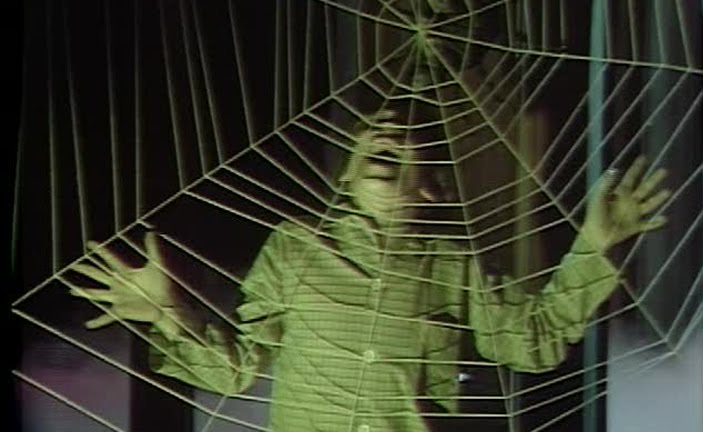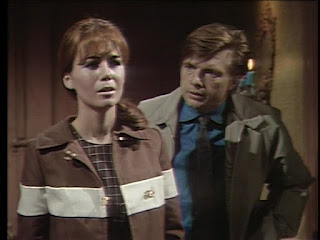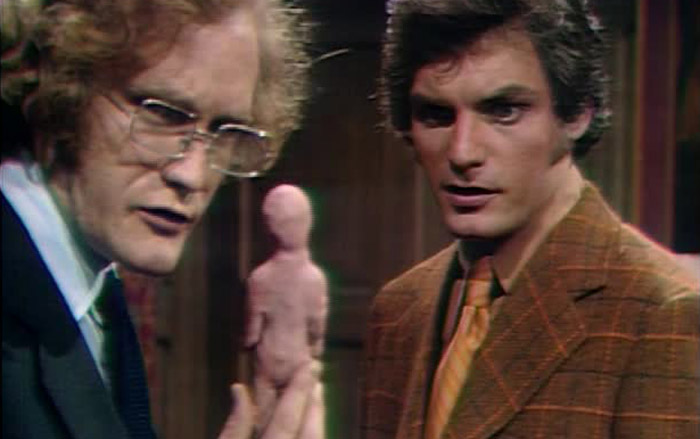
By PATRICK McCRAY
Taped on this date in 1968: Episode 497
Will the gift of swanky earrings lead to new friendships or a lifetime supply of whipped carrots? Joe Haskell is about to find out! Joe: Joel Crothers. (Repeat; 30 min.)
Julia warns Mrs. Johnson not to tell David her dream, but she does so anyway. And indeed, he has the dream. Willie is his beckoner and spiders, his fear. Meanwhile, Joe informs Maggie that her new earrings are worth $15,000. When he suggests that there will be strings attached, she accuses him of being infantile. Later, Willie pressures her to become his friend when the earrings trigger her sense of vague memory about the Old House, leading her to visit.
So, Maggie thinks that Joe needs a restaurant that “serves baby food.”
Equally redoubtable and reliable, Kathryn Leigh Scott sells the suggestion with a trooper’s lack of self-consciousness. It’s both a fabulous bit of shade and a conspicuously poorly written line for Dark Shadows. It’s so awkward that I wish they had written more dialogue like it. It is equal parts completely unbelievable and totally realistic. It is an “allow myself to introduce myself“ moment. Almost. Maggie is clearly ticked off. Clearly needs to put Joe in his place. I think she assumes that this is the best way to do it. Either that, or she thought it was going to sound a lot better than it did when it came out of her mouth. Either way, the camera fixes on Joe’s expression, which is more baffled than insulted. As well it should be. Maggie is the one sashaying around with $15,000 earrings, and Joe is either envious of the person who gave them to her or is envious of the earrings. One or the other. Probably both.
 The return of Josette is a strange bit of regression for the show. If I were Barnabas, I would demand a refund from Julia. How many times does he have to take her into the shop to get brainwashed? Between Adam and the fact that Barnabas is no longer a vampire and a dream curse that is more of an opportunity to tour the neuroses of the characters then it is to be scared, the program has run so far from Gothic romance that a gentle reminder of the show’s identity doesn’t hurt. It’s both a good post-it of where we have been and of how far we have come. There are contingents of Dark Shadows fans who dislike this storyline as if it took their lunch money and got them to write “pen 15” on their arm. It wears out his welcome now and then, but it’s also a prime example of the surprising versatility of the show’s format.
The return of Josette is a strange bit of regression for the show. If I were Barnabas, I would demand a refund from Julia. How many times does he have to take her into the shop to get brainwashed? Between Adam and the fact that Barnabas is no longer a vampire and a dream curse that is more of an opportunity to tour the neuroses of the characters then it is to be scared, the program has run so far from Gothic romance that a gentle reminder of the show’s identity doesn’t hurt. It’s both a good post-it of where we have been and of how far we have come. There are contingents of Dark Shadows fans who dislike this storyline as if it took their lunch money and got them to write “pen 15” on their arm. It wears out his welcome now and then, but it’s also a prime example of the surprising versatility of the show’s format.In terms of equal opportunity terror, the dream curse continues to impact everyone who has ever been on the show as it makes its march towards Barnabas. Thank God it got to Mrs. Johnson. Who among us has not wondered about her nightmares? Allegedly a woman who does not dream, why would she? She lives with the all-too-real fantasy of being Harry Johnson‘s mother.
Her eagerness to tell David is part of the curse, yes. We get that. And the show certainly is not ageist nor overprotective when it comes to excluding David from the accursed festivities. He gets dragged in with everyone else. If I were a recent viewer to the show, it would be easy to conclude that David were the poster boy for child psychological abuse. Because he takes a lot of it. Long-time viewers know that he is tougher than he looks, however, and in an odd way, including him in the proceedings is a sign of respectful acknowledgment that kids are more than spoonfuls of jelly necessitating constant coddling. They can be terrorized by giant dream spiders along with anyone else.
John Karlen is reliably outstanding in this episode, and the script supports him extremely well. One of his great strengths is showing characters who wrestle with deeply conflicted impulses and emotions. Most actors find challenge just accurately depicting one. Karlen can create a blend of inner conflict where each emotion is distinct-yet-blended. His desire to protect Maggie, romantically assert himself, be a friend, avoid the wrath of Barnabas, and sidestep Joe Haskell is a heady brew. He keeps it going with clarity and energy, and thus creates suspense over what will happen next that is more arresting than the horror elements in the show. It’s the episodes hidden highlight, and one of my favorite acting moments on the series.
No one’s telling HIM he needs baby food.
This episode hit the airwaves May 21, 1968.

